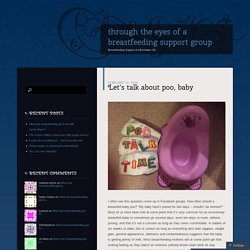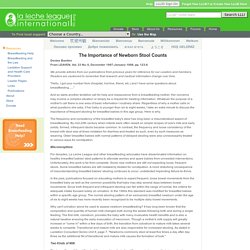

Poo after 6 weeks. Dr.Jack Newman - Infrequent bowel movements in an... Through the eyes of a breastfeeding support group. I often see this question come up in Facebook groups: how often should a breastfed baby poo?

“My baby hasn’t pooed for two days – should I be worried?” Most of us have been told at some point that it’s very common for an exclusively-breastfed baby to sometimes go several days, even ten days or more, without pooing, and that it’s not a concern as long as they seem comfortable. In babies of six weeks or older, this is correct as long as everything else (wet nappies, weight gain, general appearance, alertness and contentedness) suggests that the baby is getting plenty of milk. Most breastfeeding mothers will at some point get that sinking feeling as they watch an ominous yellowy-brown stain work its way across their baby’s vest thanks to several days’ worth of poo building up to a nappy-escaping poonami. However, there is a misconception that this applies to all exclusively-breastfed babies, regardless of age.
By Catherine Holmes Like this: Like Loading... Dr.Jack Newman - I was just asked by email to post about... Green Poop: When Should You Worry? — Nancy Mohrbacher. Normal Color and Consistency Baby’s first stools are the black and tarry meconium that was in her gut at birth.

When breastfeeding is going well, by about the third day, baby’s poop changes to “transitional stools,” which have a dark greenish color. By the fifth day or so, the poop’s color changes again to yellow. Its consistency now (and until baby begins consuming anything other than your milk) may look like split pea soup, liquid with seedy bits in it. But if your baby’s poop is all liquid and no seeds, this is also normal. Baby’s yellow poop is made mostly from the fat in your milk. If your baby is younger than 6 weeks old, is pooping fewer than 3 to 4 times per day, or her stools haven’t turned yellow by the fifth day, a weight check will tell you if this is just a normal variation or a cause for concern.
Causes of Green Poop Despite what you may have heard (see the next section), green and brown are in the normal range of poop colors. Your diet. Setting Worries to Rest. Mother-2-Mother Concerns: Green Stools. Reprinted from Mother-2-Mother.com (2000-2006), with permission from the author, Paula Y.

The occasional green stool is not unusual in the breastfed baby. Consistently green stools, however, are not normal for the breastfed baby. Most doctors don’t seem to recognize this as a potential problem because they often define “normal stool” as that of the formula-fed infant. Baby’s stool can be a wide variety of colors and textures , and not all of these are cause for concern. It is helpful to know what is normal for the bf baby as well. Consistently green stools in the breastfed baby can indicate: an imbalance of foremilk/hindmilk, often resulting in frothy green stools.a sensitivity to something in the mother’s diet, such as cow’s milk products.a sign that baby has an illness. Importance of Newborn Stool Counts. Denise Bastien From LEAVEN, Vol. 33 No. 6, December 1997-January 1998, pp. 123-6 We provide articles from our publications from previous years for reference for our Leaders and members.

Readers are cautioned to remember that research and medical information change over time. "Hello. I got your number from (hospital, hot-line, friend, etc.) and I have some questions about breastfeeding...... " And so starts another tentative call for help and reassurance from a breastfeeding mother. The frequency and consistency of the breastfed baby's stool has long been a misunderstood aspect of breastfeeding. Misconceptions For decades, La Leche League and other breastfeeding advocates have disseminated information on healthy breastfed babies' stool patterns to alleviate worries and spare babies from unneeded interventions.
Why can't urination alone be used to assess newborn breastfeeding? Two Kinds of Milk In answer to the question, "Is baby getting enough? " However, the opposite can easily occur. When...